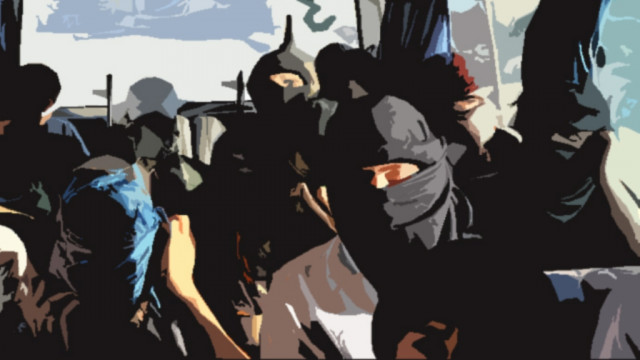Echoes of Swat, Karachi: Militants set up ‘court’ in FR Peshawar to resolve disputes
Assistant political agent refutes reports, claims administration has everything under control

Taliban militants have reportedly set up a ‘court’ in Maly Tangay, Frontier Region (FR) Peshawar. Even as locals disclose details of the militant group’s quasi justice system—ironically, set up to help locals with extortion—the FR’s political administration has denied the existence of any such court.
Residents told The Express Tribune the Taliban leadership appointed a new ameer in FR Peshawar. Talha, hailing from Darra Adam Khel, has replaced the previous ameer Hazrat Ali.
An elder, requesting anonymity, said, “They [the militants] have established a court in Maly Tangay, an area inhabited by Miam Khel which is a sub-clan of the Hassan Khel tribe. According to the elder, the court was set up a month ago and has been active since then.
“We have been told that Talha has been appointed as the militants’ new ameer in the area and Hazrat Ali has been removed,” he added.
Opportunist extortionists
The elder maintained the risky security situation caused residents to remain in a constant state of panic, and local criminals have started taking advantage of the atmosphere of fear.
“Militants target rich people, however, these criminals have started collecting money from small-scale shopkeepers and can ask for as little as Rs20,000,” he explained.
The situation is going from bad to worse and people are so afraid that they pay the money even after a single phone call, added the elder.
“The rules of the business are simple. You receive a phone call, negotiate the amount and pay it to a man you will be told to meet somewhere,” he said.
Why the quasi courts?
According to the elder, at least eight to 10 vehicles full of people visit the allegedly Taliban-established court daily. “I don’t think people go to the court to settle disputes. I think they go to negotiate the amount of the extortion money,” said the elder.
He added most well-off families have left their ancestral towns for the relative safety of Peshawar, Lahore and Karachi—a refrain oft repeated.
Administration on the look-out
On the other hand, the FR Peshawar political administration denied any such court had been set up.
Assistant Political Agent (APA) Muhammad Arif told The Express Tribune they had not received any reports from locals about the supposed Taliban court in Maly Tangay.
“I personally visited the area and it is completely under our control,” said the APA. He said the administration had re-established levies check posts in Shamshatu and Bora and a third will be soon established in Hassan Khel.
“Our infrastructure had been destroyed by militants in the past but we are in the process of reconstructing it,” added Arif. The APA said extortion was a major problem but it had largely ended after a military operation in the area early this year. “We have told locals if someone threatens them and demands money, they should immediately come to us,” said Arif.
Published in The Express Tribune, September 26th, 2014.












COMMENTS
Comments are moderated and generally will be posted if they are on-topic and not abusive.
For more information, please see our Comments FAQ